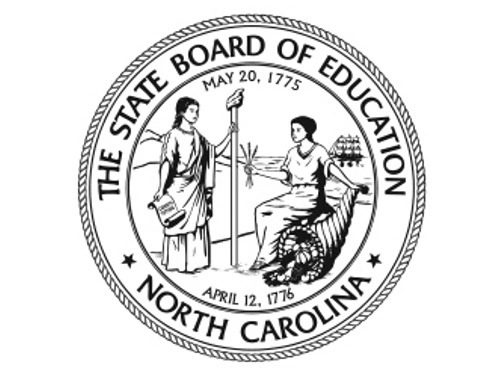
RALEIGH — During their Jan. 27 meeting, Lt. Gov. Mark Robinson and some of the Democratic members of the N.C. Board of Education clashed over whether the proposed changes to the social studies standards were an attempt to impose a political agenda or to simply include students of all backgrounds.
About an hour into the meeting, board member James Ford, a supporter of the new standards, said he was getting tired of “beating around the bush.”
“And if we’re being honest and forthright, this debate is connected to a much longer, a much broader national discourse,” said Ford.
He said he was an advisor when the revised AP U.S. History framework was being debated, and that “the same arguments were being lodged,” like that they focused too much on “subjugation and oppression of Black and LatinX and Native American folk… it doesn’t play up enough of American exceptionalism etcetera.”
He said there was no legitimate debate to be had over whether systemic racism in the American system existed or not, and to pretend there are two sides was like debating whether the earth is flat, calling it the “very fine people on both sides approach,” a reference to a common but inaccurate belief that President Donald Trump had said there were fine people on both sides of a clash between white supremacists and Black Lives Matter supporters.
Near the end of his remarks, Ford said he thinks the changes to the standards “do a good job,” and he opposed the proposed tweaks to them. He remarked that “it’s not as if they [the standards] don’t address American exceptionalism; they talk about critiquing that.
“Our job here is not to rescue America from constructive critique or to project optimism. What we need is not the power of positive thinking,” Ford said.
Robinson immediately asked to respond to Ford’s comments, saying he did not think the three changes to the standards made them any less radical.
“They do not change the first issue that I have with these standards, and the first issue I have with these standards is the overall tone,” Robinson said. “I think they are politically charged. I think they are divisive, and I think they, quite frankly, smack of a lot of leftist dogma.”
Robinson pushed back on the “code words” in the standards, like “systemic racism,” that give students a negative view of their country, stating that the “system of government we have in this nation is not systemically racist. In fact, it is not racist at all.”
Robinson closed out his remarks by stating he recognizes “plain as day” that these standards are someone’s agenda, and that he won’t “sit down and take it.”
During the meeting, Superintendent Catherine Truitt made the point that adopting these standards in no way ensures that all students would receive a “standardized approach” to learning history, government and civics. Instead, teachers and districts will take the standards and possibly adapt them using different supporting materials and curriculum.
Robinson was not the only one to object to the negative tone of the standards:
“Not so much the lower grades but the upper grades, I take away the feeling of ‘America the oppressor, not ‘America the land of opportunity,’” said board member Olivia Oxendine, a Native American who represents the Sandhills region.
“It is a tone I am receiving when I look at the standards in entirety, but especially more specifically in the upper grades,” Oxendine said.
After the meeting, Robinson’s office released a statement further underscoring his opposition to the new standards:
“As a member of the State Board of Education, I have been a part of meetings concerning new standards for our public school system in North Carolina. These standards are the foundation for education in our state, and as such are incredibly important. They exist for every grade and every core subject within the state. Such standards should be drafted without an underlying agenda, and without political motivations.
As I have said many times, we need to teach our children how to think and not what to think. Unfortunately, the standards as they are currently written do not accomplish this goal. Instead, they have been crafted by those on the radical left with an explicit agenda of being divisive, promoting left-wing ideology, and indoctrinating our students within public schools.
“One such standard can be found in the objectives for the Founding Principles of the United States of America and North Carolina: Civic Literacy. The (CL.B.1) standard states: ‘Explain how individual values and societal norms contribute to institutional discrimination and the marginalization of minority groups living under the American system of government.’
The message here is clear. American is a racist nation with systems in place designed to discriminate against minority groups. The implication? That you should hate our great nation. Unfortunately, this example is not an outlier, but instead reflects the broader sentiment that is pervasive throughout the standards, from first grade, through high school. I am opposed to these standards because of the divisive language, and the clear radical agenda being pushed on our students. Our children deserve better, and I will continue to fight to ensure that all students in North Carolina receive a quality education.”
Even before the board meeting, there was controversy over whether the board had intentionally scheduled the meeting for a time when Robinson couldn’t attend. Conrad Pogorzelski, Robinson’s chief of staff, told NSJ on Jan. 27 that they were forced into a choice between the Board of Education meeting and presiding over the Senate as it convened for the long session. He said Robinson chose to attend the board meeting because they “felt our voice being heard on the board was more important.” Also, after speaking with Senate Leader Phil Berger, he said they were confident he could lead the body, as he’s done frequently in his time as president pro tempore.
The vote on the social studies standard changes will take place next week.



